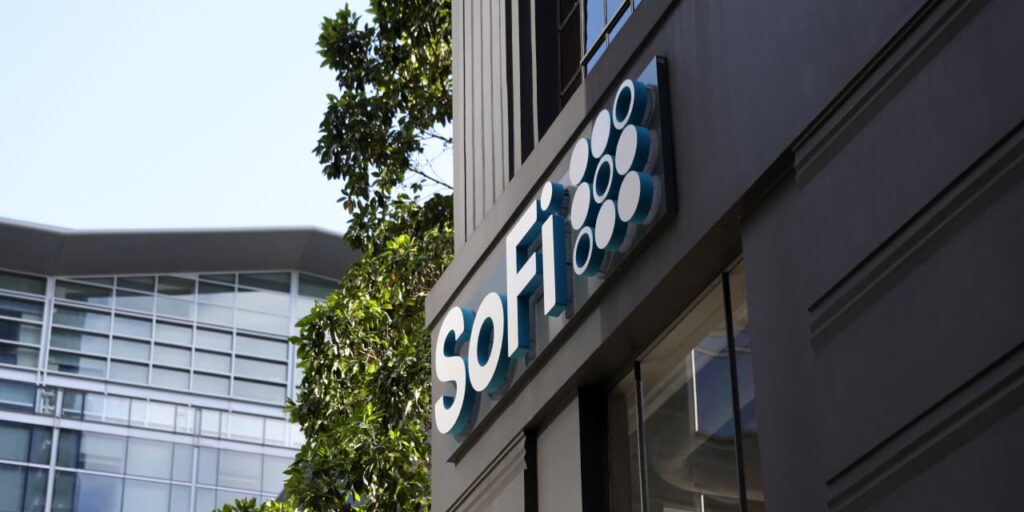SoFi Technologies
wants to become a household name. Strong quarterly numbers, Taylor Swift, and football are part of that.
In a conversation with Barron’s on Monday, Chief Executive Officer Anthony Noto spoke about how the fintech can grow, consumer awareness of the brand, and the stock’s performance.
While SoFi (ticker: SOFI) began as a lender focused on refinancing student debt, it now operates through three segments: lending, which includes student, personal, and home loans; financial services; and a technology platform. Noto said after the fintech disclosed its latest financial results that the latter two are the engines that will boost growth.
SoFi posted a third-quarter adjusted loss of 3 cents a share, while Wall Street had expected a loss of 8 cents, according to FactSet. Adjusted net revenue was $530.72 million, above the expected $511 million. Management expects to report a net profit under generally accepted accounting principles in the current quarter.
“First, 67% of our absolute growth in adjusted net revenue dollars was driven by the nonlending businesses, specifically the technology platform and financial services segments; and second, our financial services segment achieved positive contribution profit for the first time, making all three reported segments profitable while bolstering our consolidated profitability,” Noto said on a call to discuss the results with analysts.
In the third quarter, the technology platform reported a contribution profit—a segment’s total net revenue minus directly attributable expenses—of $32.19 million, up sharply from $19.54 million in the year-ago quarter. The financial services segment earned $3.26 million, compared with a loss of $52.62 million a year earlier.
Student-loan originations were $919.3 million—far above the $651.5 million forecast—“as borrowers prepared to resume student loan payments in October,” the company said in its earnings news release.
That said, student loans “really didn’t have a big impact on the quarter,” Noto told Barron’s, adding that he sees the nonlending businesses as “the driver of growth” into the fourth quarter and next year.
“I think that the best way to think about lending going forward is it will be additive to growth, as opposed to the driver of growth,” he said.
Deposits increased by $2.9 billion to a total of $15.7 billion, and the number of members, or customers, grew by more than 717,000 to more than 6.9 million.
The company lifted its financial forecasts for the full year. It now expects adjusted net revenue of $2.045 billion to $2.065 billion, up from $1.974 billion to $2.034 billion. Management predicted full-year adjusted Ebitda of $386 million to $396 million, up from $333 million to $343 million.
Those numbers, however, weren’t enough to keep the stock in the green. In early afternoon, shares of SoFi were 2.2% lower after trading higher earlier in the day. This year’s gain stands at 46%.
“SOFI continues to navigate well in a somewhat challenging environment given the macro & rate environment,” wrote Jefferies analysts led by John Hecht, who rate shares at Buy, in a Monday report.
Earlier this year, Noto told Barron’s that it was just a matter of time before his company becomes one of the country’s top 10 financial firms. The numbers say there is a long way to go.
With a market capitalization of $6.6 billion, SoFi is dwarfed by companies like
JPMorgan Chase
(JPM),
Bank of America
(BAC), and
Wells Fargo
(WFC). They boast market caps of about $409 billion, $208 billion, and $145 billion, respectively.
That makes vaulting into the top 10 a lofty goal. It may be complicated by the company’s focus on a core target customer: people whose average income is $100,000 or higher.
Focusing on relatively wealthy people may reduce credit losses because such clients have more in their wallets, but it could also limit the market SoFi can address. That might eventually make it harder to snap up new customers, a critical driver of growth and profitability for banks.
A critical step to gaining new customers is making people familiar with the company, which is exactly what SoFi’s 2019 purchase of the naming rights to SoFi Stadium in Los Angeles—host to prime-time football games and concerts—hopes to achieve.
“So it does have a big impact on our ability to reach a large unduplicated audience at a very efficient cost, which is key to driving unaided brand awareness and becoming a household brand name,” Noto told Barron’s on Monday. “In addition to that, we benefit from things like the Taylor Swift series of concerts, and her filming the documentary and movie that they released at the stadium.”
Analysts have paid attention to SoFi. Earlier this year, Truist Securities analyst Andrew Jeffrey hailed it as “the future of U.S. banking: digital, nimble and always on.” Competitors include
LendingClub
(LC),
Rocket
(RKT),
UpStart
(UPST), and
Marqeta
(MQ), according to
Piper Sandler
‘s Barker.
Oppenheimer analyst Dominick Gabriele, who rates shares at Perform, was feeling upbeat after earnings.
“SOFI continues to show diversification of products can create a balanced business for multiple cycles,” he wrote in a Monday report. “Given SOFI is still in ramp phase of customer and client penetration, we expect outsized revenue growth to continue into 2024 and less cyclically.”
Not everyone is as optimistic. Of the analysts covering the stock, 32% rate it at Buy, compared with 56% in April, according to FactSet.
SoFi was founded in 2011 and taken public on June 1, 2021, through the special purpose acquisition company Social Capital. Shares opened at $21.97 and closed at $22.65 that day, according to Dow Jones Market Data. Shares now are at $7 and change.
“We’re focused on driving a balance of revenue growth, member growth, improving profitability, and tangible book value growth,” Noto said. “And as we do that, it will be reflected in the stock.”
“I think comparing stock prices to where they were, you know, 2½ years ago misses the fact that there’s been a big crash in the market overall, and we’re obviously not immune to that either,” he added.
SoFi has already offered investors a show. The next act starts now.
Write to Emily Dattilo at [email protected]
Read the full article here













